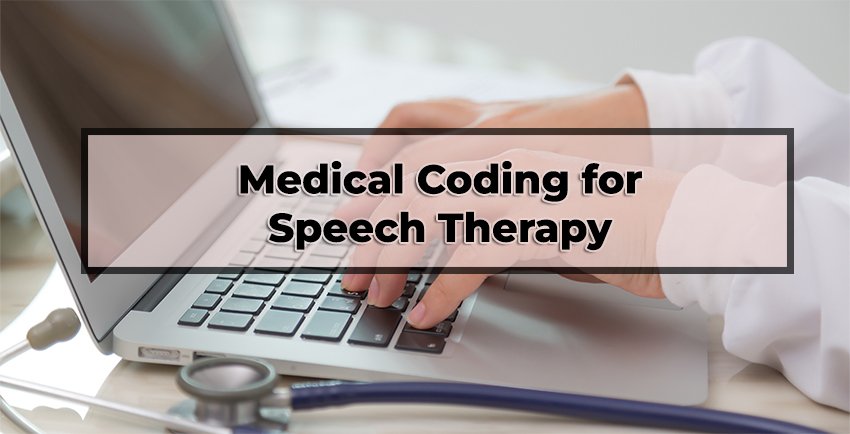Medical Coding for Speech Therapy
Speech therapy coding encompasses a range of services aimed at assessing, diagnosing, and treating speech, language, communication, and swallowing disorders. Coders play a pivotal role in documenting these services to ensure proper billing and reimbursement, as well as to support the clinical progress of patients receiving therapy. Speech therapists work with individuals of all ages, addressing issues ranging from speech delays and language disorders to voice and swallowing impairments.

CPT (Current Procedural Terminology) codes are used to represent specific speech therapy interventions, while ICD-10-CM codes reflect the condition being treated. Additionally, HCPCS codes may apply to certain equipment or assistive devices utilized in speech therapy sessions.
Understanding Core Speech Therapy Services
Speech therapy involves a variety of evaluations and treatments, each with corresponding codes for accurate documentation and billing:
- Initial Evaluations and Assessments: The speech therapy process begins with a comprehensive evaluation of the patient’s speech, language, voice, or swallowing issues. CPT code 92521 is used for evaluating speech fluency, while 92522 applies to an evaluation of speech sound production. Coders must ensure that the chosen code corresponds accurately to the type of evaluation conducted and the complexity of the patient's condition.
- Therapeutic Interventions for Speech and Language Disorders: Once the assessment is complete, speech therapists develop a tailored treatment plan. For example, CPT code 92507 covers individual speech and language therapy sessions, which may include articulation exercises, voice therapy, or language comprehension activities. Coders must document the type of therapy provided and the therapeutic goals being addressed in each session.
- Swallowing and Feeding Treatments: Coders must also accurately capture services related to swallowing and feeding therapy, which are essential for patients experiencing dysphagia or other swallowing disorders. The code 92526 is used to document dysphagia treatment, which may involve exercises to strengthen muscles involved in swallowing, adaptive techniques, and dietary modifications.
Unique Considerations in Speech Therapy Coding
- Time-Based vs. Service-Based Coding: Some speech therapy codes are service-based, meaning they are billed once per session regardless of the time spent, like 92507 for speech-language therapy. Others, particularly evaluations, may consider the time and complexity of the assessment. Coders must differentiate between these types and ensure accurate billing for the services rendered.
- Use of Functional Reporting: Functional outcomes are a vital part of speech therapy coding. Therapists must document the patient’s progress toward specific goals, and this information helps justify continued therapy. Coders need to align the documented progress with the ICD-10-CM codes to represent the condition being treated and ensure that the therapeutic interventions are appropriately justified.
- Coverage and Reimbursement Policies: Coders must be aware of payer-specific guidelines, as insurance policies may vary regarding the number of sessions covered, pre-authorization requirements, and the type of services eligible for reimbursement. Understanding these rules is crucial for successful claims and ensuring that all necessary therapy services are appropriately billed.
Documenting and Billing for Effective Speech Therapy
- Comprehensive Documentation: It is important for speech therapists to provide detailed notes on each therapy session, including the interventions performed, patient response, and any changes in treatment goals. Coders rely on these notes to accurately assign the correct CPT and ICD-10-CM codes.
- Appropriate Use of Modifiers and HCPCS Codes: Modifiers may be required to indicate unique circumstances, such as modifier -GN for speech therapy services delivered under a speech-language plan of care. Additionally, HCPCS codes are used to code for any speech therapy devices or supplies, such as augmentative and alternative communication (AAC) devices.
Coding Challenges in Speech Therapy
- Complexity of Disorders and Treatment Approaches: Speech therapy often involves multifaceted conditions, such as mixed receptive-expressive language disorders, fluency issues, and voice disturbances, each requiring a specific treatment approach. Coders must accurately reflect this diversity by assigning precise codes for both the disorder and the therapy provided.
- Tracking Patient Progress Over Time: Since speech therapy may span several weeks or months, tracking the patient's progress and adjusting coding to reflect the current stage of therapy is crucial. Coders must ensure that the codes used align with the patient’s progress and treatment modifications.
Medical coding for speech therapy is a specialized area that requires a thorough understanding of therapeutic interventions, functional outcomes, and payer guidelines. Coders play a vital role in documenting speech evaluations, language therapy, and swallowing treatments accurately, contributing to proper billing and supporting the comprehensive care of patients. As speech therapy services evolve with new treatment techniques and coding updates, maintaining accuracy and compliance is essential for the success of therapy programs and effective patient care.

